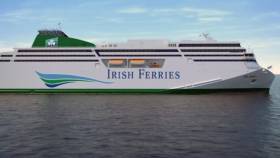Displaying items by tag: Delayed WB Yeats
€7m Bill Faces Irish Ferries for Cancelling French Services
#FerryNews - A bill of up to €7 million faces Irish Ferries for cancelling scheduled French services following delays by a German shipbuilder in finishing a new craft for the company.
The ferry operator writes The Irish Times, was forced to cancel sailings of its new ship, the WB Yeats, from Dublin to France, beginning on July 30th, because its builder, Flensburger Schiffbau-Gesellschaft (FSG), had told the Irish firm that the craft would not be ready on time.
Industry analysts at stockbrokers Goodbody and Investec calculated that the cancellations, along with the resulting compensation and rebooking of passengers on alternative services, could cost €4.5 million.
Eamon Rothwell, chief executive of the ferry company’s parent, Irish Continental Group, recently estimated that earlier cancellations, also resulting from FSG’s failure to finish the WB Yeats on schedule, would cost €2.5 million.
As a result, the delay in finishing the WB Yeats leaves the shipping group facing extra costs of €7 million at its busiest time of year.
To read more on this story, click here.
As previously covered on Afloat the newbuild cruiseferry had originally been scheduled to launch sailings earlier on July 12th, click related report here.
#FerryNews - Irish Ferries parent company, Irish Continental Group (ICG) said its revenues rose by 1.4% to €96.4m in the first four months of the year.
A trading statement from the company reported an increase in its consumer and freight business during the period.
But ICG said it had taken a €2.5m revenue hit relating to the delay in the arrival of its new WB Yeats ferry.
The ferry had been due to start sailing on the Dublin-Cherbourg route on July 12, but the company making the vessel said its delivery would be delayed which resulted in ICG cancelling a number of sailings.
For more from RTE News click here.






























































